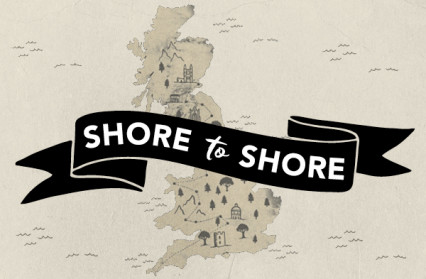Carol Ann Duffy, Gillian Clarke, Imtiaz Dharker, Jackie Kay, John Sampson
Clarence Hall, Crickhowell, 23rd June 2016
If there were any Brexiters in the several hundred strong audience in Crickhowell to hear Carol Ann Duffy and friends they probably felt discomforted; this was like a poetic rally for the Remain campaign in the final hours of the referendum vote, a defiant celebration of the culture that unites us across boundaries.
By this sixth stop on the Shore to Shore tour of England, Wales and Scotland celebrating poetry in collaboration with local bookshops, the quartet of laureates had warmed to their task, their delivery practised and fluent. Their accompanying musician John Sampson provided trumpet fanfares for each poet as well as flourishes on a range of other instruments including crumhorn, goat horn and recorders.
Up first among the poets, out-going National Poet of Wales Gillian Clarke spoke of feeling comforted by the welcome in the room on a “very anxious day”. The poems she had chosen to read included her Miracle on St David’s Day about an elective mute in Abergavenny’s former Pen-y-fal Hospital and Six Bells, 28th June 1960 about the colliery disaster near Abertillery of that date. Whether or not it was deliberate, these choices helped to make this evening feel particularly relevant to the local area and to South Wales and not just one performance of many.
At each stop on the tour a local poet is welcomed to the party, in this case Paul Henry, whose latest collection Boy Running is on the shortlist for Wales Book of the Year. His readings from the book included the touching Daylight Robbery about his son at seven years old as he said “waking up to his own vanity” and “the first in a series of letting-goes”.
Jackie Kay, the newly announced Makar, National Poet for Scotland, was introduced by John Sampson with a Scottish Reel played on the sopranino recorder. A firebrand on stage, she leavened serious subjects with humour, laughing about it being “oddly reassuring” when John Sampson (sitting on the stage throughout) gave “wee grunts” behind her in response to her poems. She quickly established great rapport with the audience, who lapped up her celebration of lifelong friendship Fiere, written in Scots but with the emotion of it made entirely comprehensible by her delivery.
An undeclared theme emerged during the first half of this performance, and it wasn’t love, or at least not romantic love. It was about parents and our relationships with them: Gillian Clarke spoke of her “very aspirational mother”, Paul Henry about the objects we inherit from parents and Jackie Kay of her elderly parents who have lived all their lives for democracy, celebrated in her poem April Sunshine.
Carol Ann Duffy has said: “If there were to be a World Laureate, then for me the role could only be filled by Imtiaz Dharker.” She did give us some love poems, but in her short time on stage much more besides, including, in Screensaver, a different view of technology in which people carry those they love in their phones.
And finally, after a dazzling performance of Mozart’s Eine kleine Nachtmusik on sopranino recorder, the UK Poet Laureate and instigator of this tour, Carol Ann Duffy. And here was the parental theme again – in Premonitions she tells of imagining she met her mother for the first time at her death and then developed the relationship backwards. My personal favourite in her selection was The Counties, written in protest at a plan by Royal Mail to delete counties from addresses, and ending with Edward Thomas’s ending of his poem Adlestrop – “all the birds of Oxfordshire and Gloucestershire”– how words can be banal and profoundly moving at the same time!
I’m sure that everyone left this performance full of joy and hope. At least until the morrow.



 Enjoyed this article? Support our writers directly by buying them a coffee and clicking this link.
Enjoyed this article? Support our writers directly by buying them a coffee and clicking this link.







